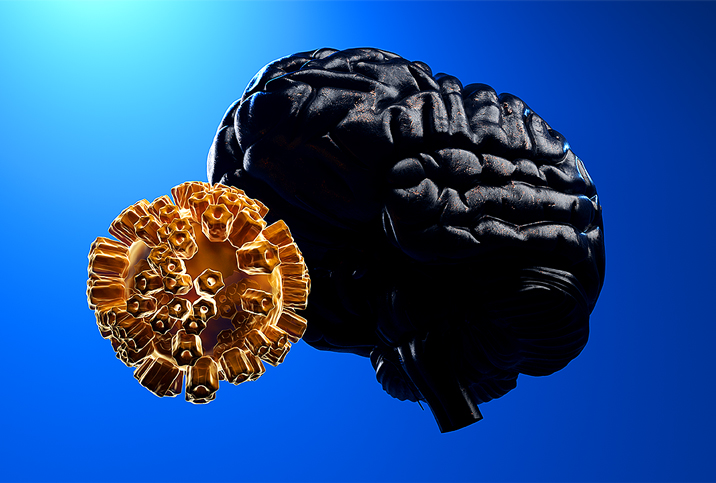How Can Herpes Affect Your Brain?

While most people think of herpes as something that attacks the skin, either in the form of cold sores or genital lesions, this common virus has also been linked to serious brain disorders like encephalitis, meningitis and even dementia.
Though these complications are serious and require medical attention, people with herpes should know that the likelihood of developing one of these disorders is rare.
If you're one of the millions of adults who has either HSV-1 or HSV-2, here's what you need to know about how the herpes virus can cause problems or damage in the brain.
How does herpes spread to the brain?
As a neurotropic virus, herpes enters the nervous system during a skin infection, either through oral transmission (HSV-1) or genital contact (HSV-2).
Depending on what type of herpes you have, sensory neurons that become infected may carry the virus to specific regions of the brain.
Brain conditions may even develop without evident clinical symptoms.
Encephalitis
Herpes encephalitis is a condition that refers to acute inflammation of the brain that can be caused by HSV-1, the type of herpes that affects an estimated two-thirds of the population under age 50 worldwide. A complication of infection with HSV-1, herpes encephalitis is thought to occur due to tissue degeneration associated with bleeding of the temporal lobe, and affects males and females in equal numbers.
Herpes encephalitis is characterized by symptoms such as headaches, fever and seizures. Because this type of encephalitis commonly affects the temporal lobe, the part of the brain that controls memory and speech, it may also cause diminished ability to communicate verbally and through writing.
Herpes encephalitis can also impact the frontal lobe, the part of the brain that controls emotions and behavior, with some sufferers displaying behavioral changes such as hyperactivity.
HSV-2 can also cause encephalitis, but usually in newborns who have been infected with the virus by their mother during birth. While the likelihood of contracting herpes during one's lifetime is high, developing encephalitis due to herpes is unlikely, representing only 10 to 15 percent of cases of viral encephalitis in the U.S.
According to Daniel Pastula, a UCHealth neuro-infectious disease specialist, "Most herpes virus encephalitis cases in adults are due to reactivation of previously acquired herpes virus (which many people are exposed to in their lifetime) as opposed to initial herpes infection through close contact."
Meningitis
While HSV-1 is more often the cause of herpes encephalitis, HSV-2 more commonly causes meningitis when it reaches the brain.
Like encephalitis, meningitis is an inflammatory condition, attacking the protective membranes of the brain and spinal cord. It is characterized by symptoms such as fever, light sensitivity, headache and a stiff neck.
Since HSV-2 can be transmitted without presenting symptoms, the timing of transmission or brain complications can be unpredictable.
Among patients with primary genital herpes, studies show that 36 percent of women and 13 percent of men have been reported to develop meningitis as a complication.
Once a person develops HSV-2 meningitis, there is up to a 42 percent chance that meningitis will recur over their lifetime.
Dementia
A 2021 paper based on observational cohort studies in four countries published in the European Journal of Neurology presented convincing evidence that there may be a link between HSV-1 and Alzheimer's disease, the most common type of dementia affecting an estimated 6.2 million Americans age 65 and older.
While more research needs to be conducted in order to confirm a causal link between herpes and cognitive decline, one Taiwanese study published in Neurotherapeutics from 2018 found that the development of dementia was prevented in 95 percent of HSV patients by anti-herpes medication.
What is the treatment for HSV-1 or HSV-2?
Antiviral drugs such as acyclovir show promise in treating neurological complications that arise from HSV.
Anyone—from infants to older adults—can develop encephalitis or meningitis due to herpes, but UCHealth's Pastula noted that risk factors for brain conditions like herpes encephalitis are thought to be "older age and a weakened immune system."
If you have HSV-1 or HSV-2 and start developing combined symptoms such as fever, headache and stiff neck, contact your physician, who will be able to perform a test to rule out anything serious.
The main thing to remember is that while encephalitis, meningitis and dementia are serious brain conditions, the likelihood of HSV-1 or HSV-2 leading to these neurological complications remains low.
Although the symptoms of herpes may be unpleasant, herpes does not necessarily lead to severe brain damage.


















